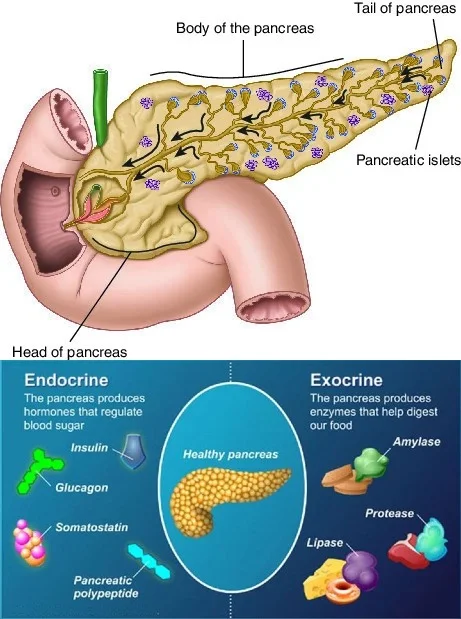Pancreatic Cancer Explained: Complete Overview and Stages
Do you know advanced pancreatic cancer treatment in India can help you enjoy your life to the fullest and fight it successfully?
Though the detection of pancreas cancer itself is a matter of concern, with the right treatment, and the right doctor by your side you can beat pancreatic cancer.
That’s why early detection is important to cure the cancer as the tumor is generally operable in the early stages.
Let’s understand pancreas cancer in detail and how early detection impacts the success rate.

What is the Pancreas?
It is an anatomical structure with two roles: secreting digestive enzymes and hormones that regulate blood glucose levels.
Digestion – It facilitates the digestion of proteins and carbohydrates by releasing digestive enzymes in the body.
Hormone Secretion – It is known to secrete the insulin hormone, which is responsible for reducing the blood sugar level of the body, and the glucagon hormone, which prevents low blood sugar.
The pancreas consists of exocrine and endocrine cells. Let us know the function and properties of these cells.
- The exocrine function involves the digestion of food in the intestine.
- The endocrine function of the pancreas helps regulate blood glucose by secreting the hormone insulin.

What are the Different Stages of Pancreatic Cancer?
We can see that a system (TNM) categorizes stages of pancreatic cancer: T- T refers to the size of the tumour; N- it means that it has spread to the lymph nodes; M- it signifies that it has spread to other parts of the body.
There are different types of lesions on the walls of abnormal pancreas. The changing cells may become cancerous and find a way for infiltration into surrounding healthy tissue. Such type of stage is also known as (T0; N0; M0)
Stage I is differentiated into Stage IA and Stage IB.
Stage IA: There are no cancerous cells in any of the lymph nodes, and there are no cancerous cells found in any part of the body other than the primary tumour (T1; N0; M0).
Stage IB: Tumor size: >2 cm (T2); regional lymph nodes and distant metastases are not observed.
In this stage, the cancer spreads to adjacent tissue and tissues near the pancreas or lymph nodes where it is present.
Stage II is divided into the following stages based on where the cancer has spread:
Stage IIA: Cancer doesn’t extend beyond the organ in which it was found, and the nearby tissue, organs, and lymph nodes are also not involved at this stage. (T3; N0; M0).
Stage IIB: The tumour was found to be confined to the primary site with the involvement of some lymph nodes or surrounding tissues or organs (T1, T2, or T3; N1) but no known metastasis to distant regional lymph nodes, major blood vessels, or nerves (M0).
There is an enlargement of the adjacent blood vessels in the vicinity of the pancreas that may have reached the surrounding lymph nodes. (T1, T2, T3 or T4, N2, or M0).
The cancer may be the size of an orange, and it may have reached various organs in the body, such as the liver, lungs, and peritoneal cavities. Adenocarcinoma cells are capable of invading lymph nodes and lymphatic vessels or adjacent pancreas and organs (T; any N; M1).
Frequently Asked Questions (FAQs):
Q1. Can pancreatic cancer be cured?
A. Pancreatic cancer can be treated fully if diagnosed at an early stage. However, in the advanced state, the duration of lifespan can be increased by using chemotherapy, radiotherapy, and targeted therapy: individually or jointly.
Q2. What is the latest treatment for pancreatic cancer?
A. These are some of the new treatment procedures that are applicable in the treatment of pancreatic cancer: Targeted Therapy and Minimally Invasive Surgeries.
Q3. Is surgery the only cure for pancreatic cancer?
A. Surgery is one of the primary methods of treating the early stages of cancer as well as for curing the disease. However, in the subsequent stage, there are still other therapies such as anticancer drugs, to achieve more years of life.
Q4. How long is the hospital stay for the treatment?
A. It depends on the extent of the disease. Post-surgery, you can stay up to 4 weeks. Your stay in the hospital may be prolonged if you have major complications.
Q5. What is the recovery time for pancreatic cancer?
A. It might take more than a year to be fully free from this problem. The doctor will check you often with a test during your visit.
Q6. What are some lifestyle changes I can make to reduce my risk of pancreatic cancer?
A. You can quit smoking, move around, drink water, and eat good food to make it less likely to get this problem.
Q7. What are some side effects of pancreatic cancer treatment?
A. Some effects are skin issues, feeling sick, low blood cell count, stomach hurting, mouth sores, being very tired, and not wanting to eat.
Q8. How often should I follow up with my doctor after pancreatic cancer treatment?
A. It is based on how you are doing. After the pancreas cancer is treated, patients should see the doctor every 3 months.
- https://www.ncbi.nlm.nih.gov/pmc/articles/PMC7904870/
- https://www.ncbi.nlm.nih.gov/pmc/articles/PMC8774130/
- https://www.ncbi.nlm.nih.gov/pmc/articles/PMC10134207/
- https://www.ncbi.nlm.nih.gov/pmc/articles/PMC4209538/
- https://www.ncbi.nlm.nih.gov/pmc/articles/PMC4115725/
- https://www.ncbi.nlm.nih.gov/pmc/articles/PMC7769746/
- https://www.ncbi.nlm.nih.gov/pmc/articles/PMC2601018/
- https://www.ncbi.nlm.nih.gov/pmc/articles/PMC4472027/
- https://www.ncbi.nlm.nih.gov/pmc/articles/PMC10002122/
Next in Pancreatic Cancer

Author Bio:
Dr. Yashashree Joshi – MBBS, MD (Philippines)
Dr. Yashashree Joshi, MD, is a globally-trained oncologist with a robust academic background and extensive experience in pioneering cancer treatments. Dedicated to patient-centered care, she continually integrates the latest advancements in oncology to provide her patients with innovative and personalized treatment plans.
Content Medically Reviewed By MedicoExperts Editorial & Clinically Review Board




